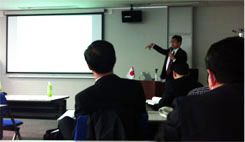Events
The 2nd Workshop on Slope Failure Caused by Torrential Rainfall in Asian Countries in the Context of Climate Change
Date: March 13, 2012
Venue: Meeting room of Headquarter Building of West Nippon Expressway Company Limited Osaka, Japan
Organized by:
- Department of Urban Management, Graduate School of Engineering, Kyoto University
- Department of Civil and Earth Resources Engineering, Graduate School of Engineering, Kyoto University
Co-organized by:
- West Nippon Expressway Company Limited
- Kyoto University Global COE Program "Global Center for Education and Research on Human Security Engineering for Asian Megacities"
Number of attendants: about 60
Report 195
Program
Outline
Recently, frequency of slope failure events caused by torrential rainfall has been increasing drastically in Asian countries due to “Climate Change”. Under the situation, Graduate School of Kyoto University initiated joint research project, which is field Monitoring of run-off and moisture infiltration into subsoil in Nakhon Nayok, Thailand, jointly with Kasetsart University, Thailand and Asian Institute of Technology, Thailand since September, 2007. Since February, 2010, based on findings obtained through the above research, Graduate School of Kyoto University and West Nippon Expressway Company Limited have conducted joint research project, entitled “A Study on Run-off and Moisture Infiltration into Subsoil Caused by Torrential Rainfall”, focusing on establishment of slope failure early warning system from a viewpoint of road disaster risk mitigation. In addition, since May, 2011, both have initiated field monitoring in Phuket, Thailand as well.
The 2nd workshop Slope Failure Caused by Torrential Rainfall in Asian Countries in the Context of Climate Change was held at Meeting room of West Nippon Expressway Company Limited, Osaka, Japan on March 13, 2012, aiming at reports of the natural disaster events in Asian countries, which were made presentation by invited Thai speakers, research counterparts from Kasetsart University, Asian Institute of Technology and Department of Highways, Thailand.
Report
In the workshop, first, Dr. Montri Dechasakulsom made presentation on “Damage on Highway due to 2011 Flooding in Thailand”, reporting not only damage on highways but also both recovery of highways affected by great flood and emergency relief for local people. Following the presentation, reports on landslide/slope failure occurred in Vietnam and Thailand and related topics such as establishment of landslide early warning system were presented by Dr. Pham Huy Giao, Dr. Suttisak Soralump, Dr. Apiniti Jotisankasa, Prof. Hiroyasu Ohtsu and Mr Tetsuo Abe, respectively. All topics were related to natural/man-made disaster risk mitigation in Southeast Asian countries, which is the one of main disciplines dealt in our GCOE projects.
Summarizing the topics presented in the workshop, it should be noted that new measures would be required. As for road administrators such as DOH, implementation of service program for road users by means of Web-site and face book to offer information of road service interruption and divergence road was absolutely effective. Furthermore, as for landslide/slope failure, the establishment of slope failure early warning system aiming at evacuation of local residents is one of the most effective measures from viewpoints of disaster risk mitigation.
In the context of climate change, even in Japan, the necessity of slope disaster prevention against torrential rainfall such as guerilla-like rainfall has been highlighted. Under such the condition, this workshop succeeded to get great concerns of participants and active discussion between presenters and participants. In addition, it revealed that the topics discussed actively in this workshop require interdisciplinary investigation to cope with the difficulties associated with realization of sustainable development and human security for the people who live there, which is actually fitting to the main themes of our GCOE program.
From such viewpoints, the discussion together with researchers and engineers in Southeast Asian countries would surely be useful and important for us to establish disciplines on “Human Security Engineering in Asian Megacities.

